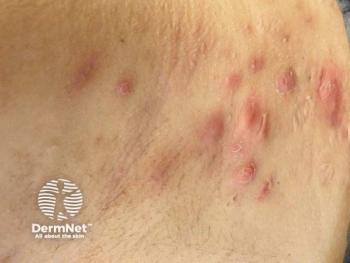
US Central and European Commands Should Revisit Disallowance of Systemic Treatments for Deployed Individuals With Psoriasis, Eczema, Paper Argues
At present, deployed members of the military are not permitted to be receiving therapy with systemic therapies such as immunomodulators and biologics.
At present, atopic dermatitis and psoriasis are considered disqualifying conditions regarding entrance into the US Military.
US Department of Defense (DoD) instruction 6130.03 Volume 1 defines disqualifying criteria for eczema as a "History of atopic dermatitis or eczema requiring treatment other than OTC hydrocortisone or moisturizer therapy in previous 36 months or with active lesions or residual hyper- or hypo-pigmented areas at time of entrance," and for psoriasis as a "History of psoriasis excluding non-recurrent childhood guttate psoriasis."1
DoD instruction 6130.03 Volume 2 notes the following as qualifying in nature: "Any condition that prevents the proper wearing of required military uniform or equipment. Any condition requiring immunomodulating or immunosuppressant medications," and notes that severe cases of atopic dermatitis and psoriasis may prevent the proper wearing of military uniforms or equipment, and may also require the use of systemic immunomodulatory or immunosuppressant medications.1
Furthermore, US Central Command Mod 15 denotes the use of biologic response modifiers, or immunomodulators, as disqualifying criteria for deployment, given that medications that require special handling or storage are not permitted.2
Authors Russell et al of a recent study, "Reappraising the use of systemic immunomodulators for psoriasis and eczema in the military," argue that medical requirements for deployment to the US Central Command and US European Command should be revisited in order to allow individuals with atopic dermatitis, eczema, and psoriasis, to join and remain in the military while receiving active treatment.
The study,3 published in Military Medicine, involved a literature search, Internet search, and an examination of medical requirements for deployment set forth by US Central Command and US European Command.
Researchers conducted the literature review utilizing databases such as PubMed, Embase, and Ovid, while reviewing records published up to the fall of 2023. The search focused on terms related to psoriasis, atopic dermatitis, eczema, prevalence, safety, efficacy, adverse events, and various systemic immunomodulators and biologics used in treatment.
Specific medications were also targeted in the search, including dupilumab, adalimumab, risankizumab, and others. After filtering for clinical trials, randomized controlled trials, and meta-analyses, researchers identified 282 articles on psoriasis and 203 articles on eczema. These were further screened based on inclusion and exclusion criteria, resulting in a total of 29 articles for review.
Researchers also conducted additional research on the Department of Defense's regulations concerning personnel with psoriasis and eczema, particularly focusing on deployment requirements for the US Central Command and US European Command, which were the most prominent in published guidance.
Understanding Treatment Guidelines
The study reviewed guidelines governing the accession, retention, and treatment of individuals with moderate to severe eczema and psoriasis. Central Command, covering the Middle East, has stringent guidelines on the use of biologics and medications with specific storage requirements among the 11 combatant commands.
Advancements in Systemic Medications
Traditionally, systemic medications for eczema and psoriasis have included immunosuppressants with significant side effects. However, the emergence of targeted biologic therapies has revolutionized treatment approaches.
For eczema, traditional immunosuppressants such as corticosteroids and methotrexate have been supplemented by more targeted biologic therapies like dupilumab. Dupilumab has shown superior efficacy compared to conventional medications, with fewer side effects and a favorable safety profile.
In psoriasis treatment, newer biologics such as risankizumab have demonstrated significant efficacy, outperforming older medications including adalimumab. These biologics offer extended dosing intervals and minimal side effects, making them ideal candidates for military deployment, according to researchers.
Addressing Deployment Challenges
Deployed service members face unique challenges in accessing and storing medications. However, the study suggests that established cold supply chains used for vaccines could be adapted for biologics. Additionally, advancements in medication formulations allow for extended dosing intervals, reducing the need for frequent refills.
Recommendations for Optimal Care
Based on their findings, researchers made several recommendations for optimizing treatment in military settings:
- Eczema: Dupilumab has emerged as a preferred systemic medication due to its efficacy, safety profile, and convenient administration route. Its dosing regimen and minimal side effects make it suitable for both garrison and deployment settings.
- Psoriasis: Risankizumab and deucravacitinib are recommended as systemic medication options for psoriasis. Their efficacy, long dosing intervals, and robust safety profiles make them well-suited for military environments.
"The advent of systemic treatments that are targeted and highly effective at treating eczema and psoriasis affords the military an opportunity to reconsider accession and retention standards," wrote Russell et al. "We recommend that select systemic biologics and immunomodulators with excellent efficacy and safety profiles be allowed for treatment of eczema and psoriasis even in the deployed environment. This will enable more people who want to join the military to serve and allow current service members with eczema and psoriasis to receive more effective care."
References
- DoD Instruction 6130.03, Volume 1 Medical standard for military service: appointment, enlistment, or induction. Office of the Under Secretary of Defense for Personnel and Readiness. May 6, 2018. Accessed April 23, 2024.
https://www.esd.whs.mil/Portals/54/Documents/DD/issuances/dodi/613003_vol1.PDF?ver=7fhqacc0jGX_R9_1iexudA%3D%3D - United States Central Command mod fifteen to USCENTCOM individual protection and individual-unit deployment policy. Accessed April 23, 2024.
https://media.defense.gov/2020/Aug/29/2002487210/-1/-1/0/USCENTCOM%20MOD%2015.PDF - Russell A, Williamson S, Rosenberg A, Cho S. Reappraising the use of systemic immunomodulators for psoriasis and eczema in the military. Mil Med. April 11, 2024. Accessed April 23, 2024.
https://doi.org/10.1093/milmed/usae139
Newsletter
Like what you’re reading? Subscribe to Dermatology Times for weekly updates on therapies, innovations, and real-world practice tips.










